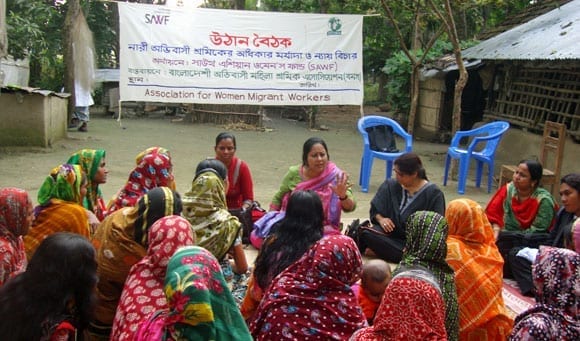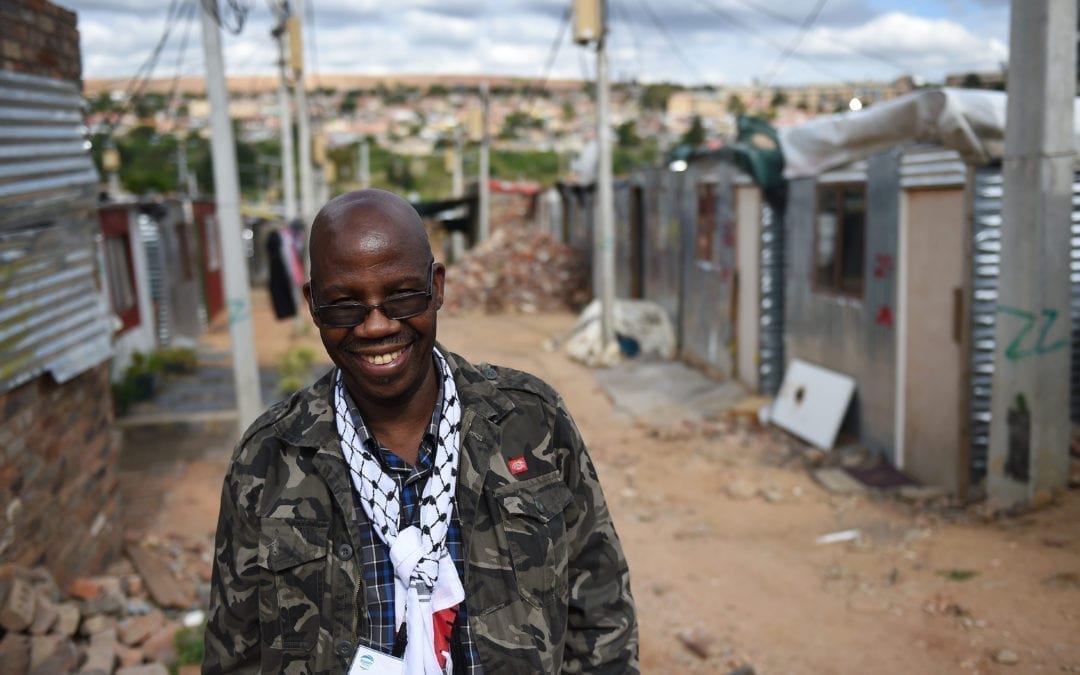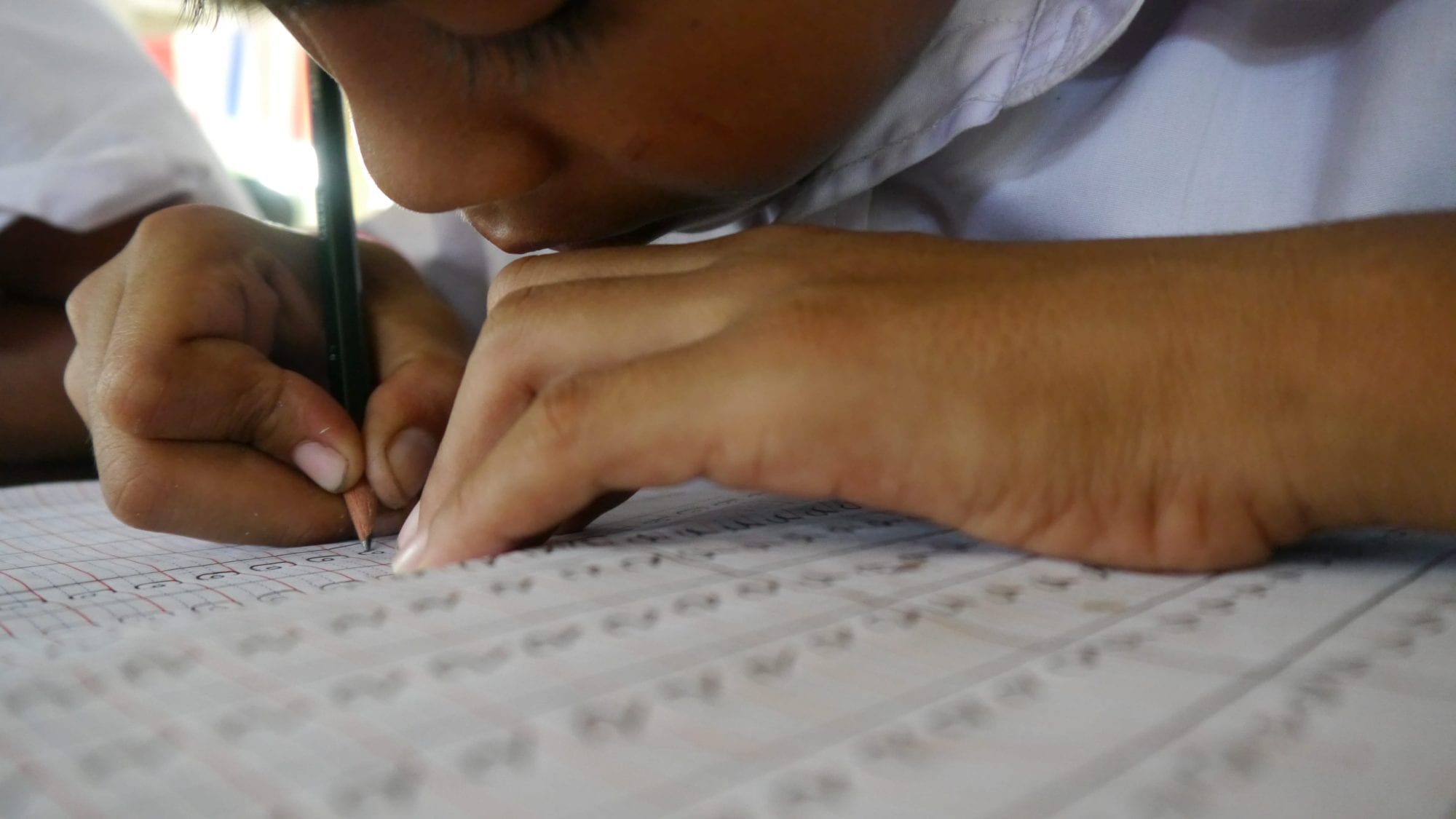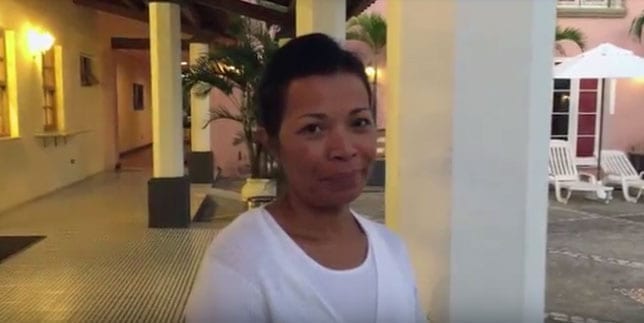
Video: Ending Gender Violence at Work with Collective Action
Seeking a job to support her family but lacking opportunity in her native Bangladesh, Shahida became a domestic worker far from her home. Beyond duties in her employer’s home, she was forced to work at the houses of several of his relatives, giving her little time to sleep. Shahida was provided stale leftovers for her meals. She faced harassment and abuse from many quarters.
“They misbehaved with me a lot… This was often accompanied by physical abuse,” says Shahida. (See video.)
More than 50 percent of female migrant workers in Bangladesh are employed as domestic workers. Isolated in private homes, they often are targets of violence and abuse because they are women. And as migrant workers, they often face exploitation across the migration experience—from labor recruiters, transport workers, border guards, employers and legal systems that protect employers over workers.
Yet joining with other migrant domestic workers through the Bangladesh Obivashi Mohila Sramik Association (BOMSA), Shahida is now among women demanding gender justice on their jobs, in their communities and at the global level, where they are championing an International Labor Organization standard on gender-based violence at work.
The Solidarity Center is partnering with BOMSA to promote fair migration through awareness-raising, policy reform and improved access to justice under the global labor program supported by the USAID.
By engaging in collective action, Shahida says, “now, we feel empowered.
“We have the power to do what we want to.”

South Africa Miners Formed Union ‘to Fight Exploitation’
When Joe Montisetse came to South Africa from Botswana to work in gold mines in the early 1980s, he saw a black pool of water deep in a mine that signified deadly methane. Yet after he brought up the issue to supervisors, they insisted he continue working, but Montisetse refused.
Two co-workers were killed a few hours later when the methane exploded.
Today, Montisete is newly elected president of the National Union of Mineworkers, a position he achieved after helping form a local union at the gold mine soon after his co-workers’ deaths. After they formed the union, workers were safer, he says.
“We formed union as mine workers to defend against oppression and exploitation.”

Migrant Workers in Thailand Arrested for Volunteering
Two female migrant workers from Myanmar were arrested in Thailand, fined and await deportation for volunteering their time to teach children of migrant workers at a Buddhist monastery, an action the Thailand-based Human Rights and Development Foundation (HRDF) is calling “illegitimate and unjustified.”
The two women, who hold valid passports, visas and work permits, volunteered at the Laem Nok Monastery in southern Thailand in addition to the jobs for which they were hired. But immigration officials charged them with performing work without a permit to teach, even though the time they spend instructing the children is unpaid, according to HRDF and the Migrant Working Group (MWG). The MWG is a network of non-governmental organizations working on health, education and migrant workers’ rights that includes the Solidarity Center.
The arrests occurred despite the statement of one worker’s employer who told police the worker is lawfully employed and has been excused to take leave from her regular job painting boats because she is pregnant. The monastery also affirmed the two workers taught without pay, actions that are not illegal in Thailand, says HRDF, a Solidarity Center partner.
The women were forced to sign a document in Thai that they did not understand, in which they admitted they committed a crime, and received a fine of 5,000 Baht ($153) in lieu of imprisonment. They will be banned from re-entering to work in Thailand for two years, according to HRDF. A Myanmar national holding a tourist visa who observed the volunteers teaching was also arrested on the same charge.
“The arrests could signal a strong discouragement to other similar teaching programs in the country and could also pose a negative impact on education opportunities for migrant children as a whole,” HRDF and MWG said in a statement.
Volunteers Taught Children at Risk of Exploitation
The Laem Nok Monastery has operated a learning center for children of migrant workers for more than four years. The program began after the community recognized that migrant children, who are often left without care when their parents are working can be targets of forced labor, human trafficking and other forms of exploitation. With support from community fundraising, the monastery dedicated a learning space where children are taught the languages and cultures of Thailand as well as those of their origin countries. Local businesses provide funding for food and teaching supplies, but the teachers are unpaid volunteers, including local college students.
HRDF and MWG are calling on Thailand’s Department of Employment, Ministry of Labor to establish clear guidelines for enforcing compliance with work permits and to review the policy that restricts migrant workers from becoming paid or unpaid volunteers.
The groups also are urging police to ensure migrant workers’ legal rights are respected, including the right to legal counsel and to bail during pre-trial.
“The arrests have created undeserving traumas to the children in the classroom who had to witness their teachers being arrested and taken away in front of them,” says HRDF.

‘Domestic Workers Work from Morning to Evening with No Break’
I am Marie Constant, I am from Madagascar. I have worked as a domestic worker in Lebanon since 1997. I work for one person only. The work is difficult, especially when we receive guests as we don’t have choice but stay up late working until the guests leave which is usually around midnight or sometimes around 1 a.m.
In general, the domestic workers don’t have a choice as they need to work from morning until evening with no specific break time and no holidays. And because of these rights abuse, we decided to form a union to defend our rights. Also, the fact that most domestic workers don’t have the right to weekly leave, we try to reach out to all the domestic workers women in most of the regions to educate them about their rights.
